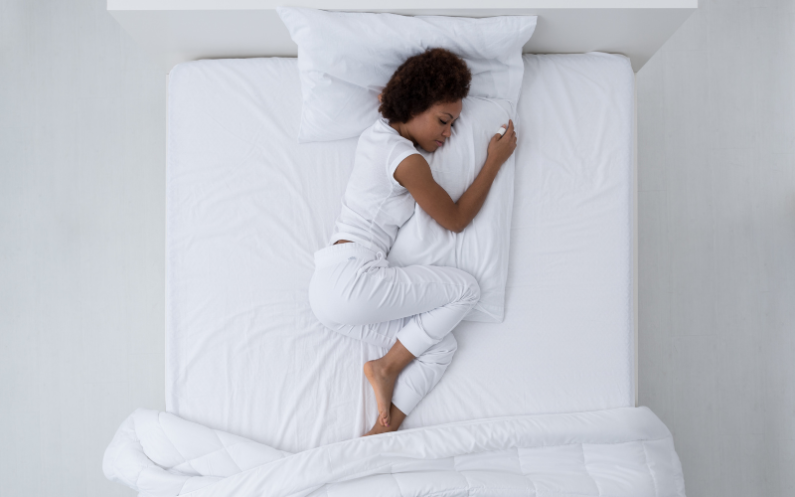If you’re tired of not sleeping well or waking up feeling like you’re still exhausted, then you’re not alone. Research shows that sleep deficiency is a common problem in the United States.
While sleep deficiency is often not taken as seriously as other conditions or health problems, studies show that lack of sleep is linked to chronic diseases, such as heart disease, high blood pressure, stroke, depression, diabetes, kidney disease, and more. It also affects cognition and your ability to think.
Here’s why sleep is so important for your overall health and what to do if you’re struggling to fall asleep and stay asleep each night.
How Does Sleep Affect The Body?
Sleep is imperative for healthy functioning – even survival. Research shows that sleep is also critical for waking cognition, which helps us think clearly, be alert and vigilant, and pay attention.
During sleep, your brain consolidates memories and clears toxins from brain cells. It’s also necessary for the regulation of our emotions and how we respond to challenges in our daily life.
According to one study, people who are sleep deprived respond to low stressors the same way that people who have had adequate levels of sleep respond to high stressors. In other words, you’re more likely to overreact when you’re sleep deprived.
Researchers at the National Heart, Lung, and Blood Institute stated that sleep affects almost every tissue in the body. It affects stress and growth hormones, the immune system, breathing, appetite, cardiovascular health, and blood pressure.
Lack of sleep increases your risk of heart disease, infections, and obesity, according to the researchers. This is because during the night, your breathing rate, heart rate, and blood pressure rise and fall, which is a process that is important for heart health.
Also during sleep, the body releases hormones that control your energy reserves and repairs cells. However, these hormones can also affect your weight. Lack of sleep increases a person’s risk of diabetes, even if they are otherwise healthy.
Not sleeping enough can also change the way your body responds to vaccinations. Research shows that people who get enough sleep develop stronger protection against the flu virus after being vaccinated.
Sleep helps you maintain a healthy balance of hormones in the body that control hunger. Ghrelin is a hormone that makes you feel hungry while leptin tells you when you’re full.
The balance between these two hormones can be thrown off by lack of sleep. Your ghrelin levels increase while your leptin levels decrease, which makes you feel hungrier when you have not slept enough.
Additionally, sleep also affects how you respond to insulin. Research shows that lack of sleep may cause higher than normal blood sugar levels, increasing your risk of developing diabetes.
How Much Sleep Do I Need?
Although everyone is different, the NIH states that a good night’s sleep consists of four to five sleep cycles. Each cycle includes a period of deep sleep and rapid eye movement (REM).
On average, most adults need between seven and eight hours of sleep each night. Babies need to sleep 16 hours a day while children and teenagers need to sleep eight to ten hours per night.
 How To Get Better Sleep
How To Get Better Sleep
There are many things that can disrupt your sleep. The most common are stimulants, such as caffeine, alcohol, and medications.
Your phone, tablet, or laptop may also be keeping you awake at night. Research shows that blue light suppresses melatonin levels, making it harder for you to fall asleep and stay asleep.
Additionally, as you get older, you may find it harder to sleep. The NIH states that approximately 70 million Americans suffer from chronic sleep problems, including sleep apnea and insomnia.
Here are some tips to help you sleep better:
1. Consider reducing your screen time, especially before bed.
Some people like to fall asleep with the TV on in the background or by scrolling through their news feed on their phones. However, this can make it harder for you to fall asleep.
One study found that watching TV for more than two hours per day was linked to problems falling asleep, waking up in the middle of the night, and waking up early without being able to fall asleep again.
Blue light, or the light that is omitted from your electronic devices, reduces the production of melatonin in the brain, which is the hormone needed to tell your body when it’s time to sleep.
Many experts recommend turning off the screens two hours before bed. Reading, meditating, or spending time outside before bed might make it easier to sleep than watching TV.
2. Calm your mind.
If something is bothering you, don’t take it to bed. This will only cause you to stay awake and worry. Supporting your brain health when you’re stressed can help promote sleep.
SolCalm Balance contains amino acids, vitamins, and minerals to support neurotransmitter production, which are the chemical messengers that regulate your memory, mood, and sleep cycle.
The formula is designed to promote a calm, focused state to help you better handle stress, which also helps you sleep better.
3. Keep the same schedule daily, even on weekends.
Your body’s internal clock will regulate itself if you keep a steady sleep schedule, even on weekends. Try going to bed and waking up at the same time every day.
It may also help to keep your bedroom cool and dark. Getting physical activity outside everyday (but not right before bed) can help ensure that you’re tired enough to fall asleep at night.
Other helpful tips include avoiding heavy meals before bed, utilizing relaxation techniques (such as breathing exercises, mediation, or taking a hot bath), and reducing stimulants, such as nicotine and caffeine.
Some research suggests that caffeine can stay in your system for up to eight or ten hours. So, make sure your last cup of coffee is well before bedtime. Instead, try a hot, decaf drink like herbal tea with lemon to flush toxins, clear the mind, and help you relax.

